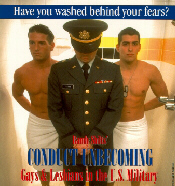 |

|
|
Joins Three Previous Appellate Court Decisions Made "Don't Ask, Don't Tell" May Go to Supreme Court |
| Compiled by Badpuppy's GayToday From SLDN Reports
The Second Circuit Court of Appeals joins three other appellate courts in the Fourth, Eighth and Ninth Circuits that have upheld the current policy on gays in the military. There are no other cases challenging "Don't Ask, Don't Tell, Don't Pursue" pending before district or appellate courts. C. Dixon Osburn, Co-Executive Director of Servicemembers Legal Defense Network, which filed an amicus brief in the case, stated, "Americans should be concerned when the courts hold the military above the law. Contrary to the court's opinion today, the Constitution does not permit our government to fire people from their jobs for being gay. Obviously, we are very disappointed in the court's opinion and will have to redouble our efforts to convince the American people that military readiness is not served by witch hunts, death threats, and firing decorated soldiers from their jobs." The decision today overturns a lower court decision by Judge Eugene Nickerson who ruled on July 2, 1997 that the military's policy creates "special rules" that treat gay service members differently than heterosexual service members for saying and doing the same things in violation of the constitutional guarantee of equal protection under the laws. The six service members who brought the challenge to "Don't Ask, Don't Tell, Don't Pursue" may ask the Second Circuit to sit en banc and hear an appeal of the case or they may petition the United States Supreme Court to review today's decision. The case was brought on behalf of the service members by Lambda Legal Defense & Education Fund and the ACLU Lesbian and Gay Rights Project, both in New York.
Today's decision comes on the heels of a new survey released on September 4, 1998 indicating a significant drop in "strong opposition" to gay men and lesbians in the military by soldiers. The survey, conducted by Professor Charles Moskos of Northwestern University, the author of "Don't Ask, Don't Tell, Don't Pursue," and Laura Miller of UCLA, found that the number of Army men strongly opposed to the presence of gay men and lesbians in the military has dropped from 67% in 1992 to 36% in 1998. Army women's opposition has also dropped significantly from 31% in 1992 to 16% in 1998, according to the recent study. |
 Washington, D.C. -- The Second Circuit Court of Appeals upheld on Wednesday the Administration's "Don't Ask, Don't Tell, Don't Pursue" policy in Able v. USA, a case that was closely watched by human rights advocates and the Pentagon.
Washington, D.C. -- The Second Circuit Court of Appeals upheld on Wednesday the Administration's "Don't Ask, Don't Tell, Don't Pursue" policy in Able v. USA, a case that was closely watched by human rights advocates and the Pentagon.
 In a report released earlier this year, Servicemembers Legal Defense
Network documented that "commanders continue to ask, pursue and harass"
service members in direct violation of "Don't Ask, Don't Tell, Don't
Pursue." In April, the Pentagon released statistics showing that it had
discharged 997 gays in 1997, a 67% increase since the implementation of
"Don't Ask, Don't Tell, Don't Pursue" and the highest number of discharges
since 1989. SLDN reports that the cost of firing gays in the military
last year exceeded $29 million.
In a report released earlier this year, Servicemembers Legal Defense
Network documented that "commanders continue to ask, pursue and harass"
service members in direct violation of "Don't Ask, Don't Tell, Don't
Pursue." In April, the Pentagon released statistics showing that it had
discharged 997 gays in 1997, a 67% increase since the implementation of
"Don't Ask, Don't Tell, Don't Pursue" and the highest number of discharges
since 1989. SLDN reports that the cost of firing gays in the military
last year exceeded $29 million.
